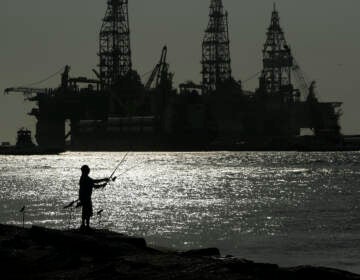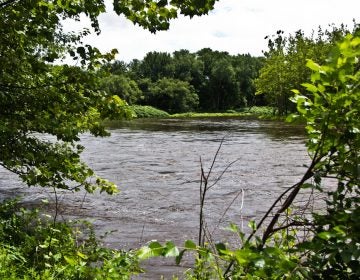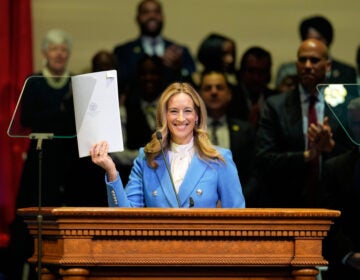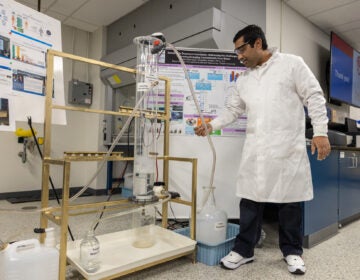Climate change could significantly impact commercial fishing, Rutgers study says
Climate change is causing fish species to travel in search of suitable temperatures, and it’s impacting the marine food web, a Rutgers study finds.

F.I.S.H. Night at Camden's Adventure Aquarium. (Adventure Aquarium)
This story is part of the WHYY News Climate Desk, bringing you news and solutions for our changing region.
From the Poconos to the Jersey Shore to the mouth of the Delaware Bay, what do you want to know about climate change? What would you like us to cover? Get in touch.
Fish such as cod, anchovy and sardines could decline in the future as climate change forces marine species to find survivable ocean temperatures and disrupts predator-prey relationships, according to a new Rutgers University study. The authors say this could have implications for the fishing industry.
Marine species require certain temperatures to survive and reproduce, and they also need to eat. Rutgers researchers evaluated the relationship between survivable ocean temperatures and species’ need to find prey.
They found that climate change could dramatically reshuffle marine food webs (how one species feeds on another), and that predator-prey interactions could prevent marine species from keeping up with the temperatures they need to flourish. The result is fewer productive species that can then be caught by fisheries, and feed the world.
“Marine life, in many ways, is at the frontlines of experiencing the effects of climate change — they’re moving to new locations much faster than species on land, for example,” said study author Malin Pinsky, an associate professor of ecology, evolution, and natural resources at Rutgers.
“What we’re seeing is that as species move to new locations, [predator-prey] interactions between species are also changing dramatically,” he said. “It’s almost like we’re shaking a snow globe that is the global ocean, and the way it’s settling back down is very different than the way it was before.”
These findings have implications for the fishing industry, which relies on species population growth to support local economies and put food on peoples’ plates, Pinsky said. It’s estimated that 3 billion people worldwide rely on wild-caught and farmed seafood as a primary source of protein.
Conflicts over fisheries have already broken out as fish move across boundaries. Climate change and decreasing fish abundance have affected where fishers fish, leading to what has been dubbed the “global fish wars.” In February, the U.S. government sent naval ships to the South China Seas, where there was armed tension over dwindling fishing grounds. This kind of friction is another reason why the impacts of climate change on fish species can’t be ignored, Pinsky said.
He argues the study results suggest that avoiding overfishing is more crucial than ever.
“It’s especially important to rebuild overfished populations, because that will help them be more resilient to these kinds of climate effects,” Pinsky said.
The Atlantic States Marine Fisheries Commission, along with other organizations that manage fisheries, are partnering with NOAA Fisheries to evaluate climate change predictions to implement commercial fishing standards and respond to environmental changes quickly and efficiently.
“We’ve seen that climate change is becoming a growing threat to our East Coast fisheries,” said Toni Kern, fisheries policy director for Atlantic States Marine Fisheries Commission.
“We’ve seen climate-related shifts and distributions, abundance and productivity of certain species along the East Coast, and because we’re uncertain of how future conditions may be … we need to prepare in our governance structure, how we manage the fish stocks for different and unexpected futures,” she said.
The Rutgers study is a cautionary tale about the impacts of climate change, Pinsky warns.
“If we want to avoid the most negative outcomes, we need a rapid transition to technologies like solar and wind energy, more energy efficient buildings, more public transportation,” he said.
“Time really is running out to avoid the worst impacts of climate change. And at least to me personally, that’s really important when I think about my kids and the kind of future they’re going to grow up in.”

Get daily updates from WHYY News!
WHYY is your source for fact-based, in-depth journalism and information. As a nonprofit organization, we rely on financial support from readers like you. Please give today.







